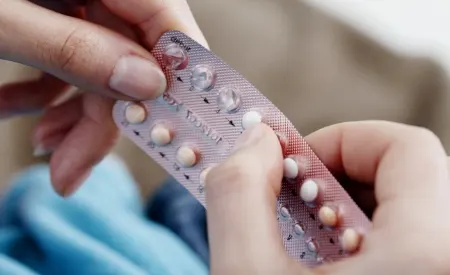Menstruation is a natural phenomenon that a majority of women experience during their lifetime. It's a sign of a healthy reproductive system and is associated with various bodily functions. However, many women notice that their menstrual cycle dates can fluctuate over time. Why does this happen? What causes menstrual cycle to change dates? This article delves into the reasons behind these shifts and offers insight into this common occurrence.
Why Do Periods Change Dates?
The menstrual cycle, while often considered a monthly event, is not necessarily a fixed 28-day cycle for all women. The cycle's length can range from 21 to 35 days in adult women and from 21 to 45 days in young teenagers. But if you’re wondering, ‘why did my cycle change from 28 to 31 days?’ then the answer is that there are various factors that can contribute to these variations, including hormonal changes, lifestyle factors, and certain medical conditions. The notion of a 'regular' period is subjective and can differ from one woman to another.

Know How Your Menstrual Cycle Works to Understand Why Periods Change Dates
To comprehend why menstrual dates can change, it's crucial to first understand how the menstrual cycle operates:
- The Follicular Phase: This begins on the first day of your period and continues until ovulation. The primary hormone at play here is oestrogen, which causes the lining of the uterus to thicken in preparation for a fertilised egg.
- Ovulation: Around the midpoint of your cycle, a mature egg is released from the ovaries. This process, known as ovulation, is driven by a surge in the luteinising hormone (LH).
- The Luteal Phase: After ovulation, if the egg isn't fertilised, the lining of the uterus starts to break down. Progesterone levels drop, leading to menstruation.
Many factors, such as stress, weight changes, and certain medications, can disrupt this delicate hormonal balance, leading to alterations in the menstrual cycle's timing and duration.
Being informed and using products like Always sanitary pads can ensure comfort and protection during this natural phase of womanhood. For instance, the Cotton Soft pads lets you enjoy real cottony softness with ultimate protection. They are flexible and well-fitting, and designed with a soft cover that is gentle on your skin. Its flexi channels ensure that you don't feel any discomfort when you're on the move.
Does Contraception Affect Changing Period Dates?
Absolutely. Birth control methods, particularly hormonal ones like the pill, patches, and intrauterine devices (IUDs), can influence your menstrual cycle. They work by altering the natural levels of hormones in your body. This can result in lighter, less painful periods, or in some cases, stop them altogether. When one discontinues or changes their contraceptive method, it can also lead to changes in the cycle's duration and timing.

The Link Between Your Mental Health and Menstrual Cycle
Our mental well-being can significantly impact our menstrual cycle. Chronic stress or anxiety can lead to an imbalance of hormones, particularly cortisol, which can delay or even stop ovulation, leading to irregular periods. Moreover, conditions like polycystic ovary syndrome (PCOS) can not only cause menstrual irregularities but also contribute to anxiety and depression.
How Changes in Your Physical Health Affect Your Menstrual Cycle
Physical well-being is closely tied to menstrual health. Factors include:
1. Weight
Drastic changes in weight, either a rapid gain or loss, can alter the hormone levels in your body. Particularly, body fat affects the production of oestrogen, a key hormone in regulating the menstrual cycle. An imbalance in oestrogen levels can lead to menstrual irregularities, including skipped periods or even amenorrhea (the absence of menstruation).
2. Exercise
Engaging in intense physical activity, especially when it's sudden or extreme, can cause a disruption in the menstrual cycle. Athletes or individuals with strenuous exercise regimens might experience amenorrhea due to a combination of low body fat and stress on the body. On the other hand, regular moderate exercise can promote hormonal balance and support a regular menstrual cycle.

3. Diet
Maintaining a balanced diet is vital for overall health and particularly for menstrual regularity. Nutritional deficiencies, especially in iron, can affect menstruation. Malnutrition or conditions like eating disorders can lead to decreased oestrogen levels, resulting in lighter periods, irregular cycles, or the absence of periods.
4. Medical Conditions
Certain medical conditions have a direct impact on menstrual regularity. For instance, thyroid disorders can cause periods to be infrequent, heavy, or prolonged. Similarly, polycystic ovary syndrome (PCOS) is associated with hormonal imbalances that can lead to irregular periods or even absent menstruation. Proper diagnosis and management of these conditions are essential to restore menstrual health.

When to see a doctor?
Although variations in menstrual cycle length is not alarming, there are certain signs that one must not ignore. These include:
- Experiencing severe pain during your period.
- Missing periods for more than three months without being pregnant.
- Noticing significant changes in the duration or heaviness of periods.
- Experiencing spotting between periods.
- Having cycles that are consistently shorter than 21 days or longer than 40 days.
In conclusion, the questions, ‘What causes menstrual cycle to change dates?’ is multifaceted. If you've ever pondered, ‘Why did my cycle change from 28 to 31 days?’, it could be due to numerous reasons ranging from mental and physical health to the use of contraceptives.
The body's intricate hormonal play means the menstrual cycle can be sensitive to several changes. If you've noticed the changes and are thinking, "Why does my period date change every month?", remember that minor fluctuations are often normal. However, if the changes are consistent and concerning, it's crucial to seek medical advice.
FAQs
1. What causes menstrual cycle to change dates every month for some women?
Various factors can lead to changes in menstrual cycle dates. Hormonal fluctuations, lifestyle shifts, stress, and certain health conditions are among the primary causes. While many consider a 28-day cycle as the norm, cycles can naturally range from 21 to 35 days in adult women.2. Why does my period date change every month? Can factors like diet and stress influence these fluctuations?
Absolutely, external factors play a significant role in the consistency of menstrual cycle dates. Chronic stress, in particular, can affect hormonal balance, possibly causing changes in ovulation. Likewise, significant dietary alterations or malnutrition can disrupt the equilibrium of hormones necessary for a regular cycle.3. I noticed a change of date in menstruation; specifically, why did my cycle change from 28 to 31 days? Is this normal as one gets older?
Age can influence menstrual regularity, especially during transitional phases like [puberty](/tips-and-advice-for-girls-and-parents/puberty) or as one approaches menopause. However, while it's common to experience some variations in menstrual cycle dates over the years, persistent or sudden changes, such as shifting from a 28-day to a 31-day cycle, should be a topic of discussion with a healthcare professional. Monitoring one's cycle and seeking medical insight when changes seem unusual is always recommended.Disclaimer:
Please note the date of last review or update on all articles. No content on this site, regardless of date, should ever be used as a substitute for direct medical advice, diagnosis or treatment from your doctor or other qualified clinician. Always is committed to ensuring that all of our products meet rigorous safety standards; Always pads prioritize safety, protection and comfort of its consumers.





